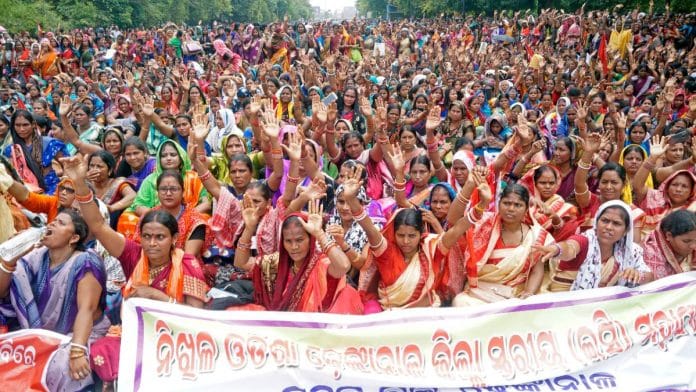New Delhi: Gram Panchayats should be delegated more authority and power to raise revenue from local taxes to make them more citizen-oriented and ensure proper implementation of the 73rd Constitutional Amendment Act of 1992, according to a World Bank policy research paper released last week.
The Act provided for a three-tier Panchayati Raj system at the village, intermediate, and district level, and empowered states to take the necessary steps that would lead to the formalisation of the village-level Gram Panchayats (GPs) and help them operate as units of self-governance.
The World Bank working paper, titled ‘Two Hundred and Fifty-Thousand Democracies — A Review of Village Government in India’, reviews key findings from empirical studies done in the past on various aspects of functioning of Panchayati Raj Institutions (PRIs).
Authored by Vijayendra Rao, lead economist in the Development Research Group at the World Bank, Siddharth George, from National University of Singapore, and M.R. Sharan, Assistant Professor in the Department of Agricultural and Resource Economics in University of Maryland, the paper makes key recommendations for improving the functioning of GPs — the lowest level of self-governance.
In the paper, the authors have traced the history of Panchayats (or village councils) from the pre-Independence era to 1993 onwards, when the 73rd Constitutional Amendment came into force, looking at the nature of the institution, its role and composition of leadership.
“While the 73rd Amendment and the consequent institutionalisation of Panchayati Raj enhanced the role of Panchayats as ‘last-mile’ implementers, progress has been slow on actually devolving decision-making powers to GPs,” the paper states.
Over three decades after the passage of the 73rd Amendment, which was aimed at decentralisation of power and decision-making from the Centre and states to PRIs, “Panchayats are not quite independently functioning units. They rely almost entirely on grants made by state and national authorities,” the paper underlines.
In several states, the panchayats are allowed to collect property tax. For instance, in Kerala, which is among the most decentralised panchayat systems in the country, only 9.16 percent of expenditures were financed by local taxes in 2013-14, according to the paper. In Karnataka, 2.77 percent of expenditures were financed by local taxes in 2020-21, it said.
While state governments have devolved essential functions in sectors such as health, education, etc. to Panchayats, financial powers to generate local revenue are limited. To strengthen local self-governance, the paper says, the ability of panchayats to self-finance their activities is important.
“Panchayats’ autonomy will always be curtailed if they cannot raise revenue levels from above the very low-levels at which they stand. Tax collection by Panchayats could improve with devolution of functions: when Panchayats are seen to be responsible for a wider range of tasks, their legitimacy improves in the eyes of the citizens, which could translate to greater local revenues,” the paper says.
The authors recommend that local tax collection can be improved by giving “more freedom (to Panchayats or GPs) to levy their own taxes and cesses”. Filling up of vacancies of bill collector and streamlining property records, including digitised village maps, are other measures that need to be put in place to boost revenue from local sources, they state.
Political and financial decentralisation were key aspects of the 73rd Amendment and were aimed at improving the efficiency, responsiveness, and inclusiveness of local governance. But in most panchayats, the authors say, decision-making powers are restricted.
Also Read: SC clips khap panchayats’ wings on marriages. But how did they get these wings?
Need to reassess devolution of powers to Panchayats
The 73rd Constitutional Amendment mandated a three-tier system of local government across states, consisting of village (GP), intermediate (Block Panchayat) and district (Zila Panchayat) levels.
While state governments have devolved powers to PRIs, most panchayat functionaries are believed to not have much decision-making powers.
The Mahatma Gandhi National Rural Employment Guarantee Scheme (MGNREGS), which is the world’s largest rural employment guarantee scheme, is a case in point. It is one of the important schemes through which funds are allocated by the Centre.
The World Bank paper states that Panchayat leaders are empowered to generate work by assigning workers to village-based projects, but these are subject to approval by higher officials.
“While Panchayats are on paper responsible for the MGNREGS, they do not have a strong say in project selection, project implementation or payments. This makes fixing accountability particularly problematic,” it says.
Members of the GPs, the paper adds, act as intermediaries tasked with project implementation — “… glorified middlemen, so to speak, rather than empowered decision-makers charting their own course.”
The paper recommends that greater authority in decision-making and to generate revenue should be given to Panchayats “rather than stripping them of power”.
“These steps are crucial in an era where the proliferation of online payment systems, MIS-based beneficiary selection, and digital tracking of beneficiaries has led to a ‘recentralisation’ process, eroding the autonomy of local governments over key functions,” the paper says.
It also recommends improving the way data related to work done, expenditure, etc. is managed at the panchayat level, and suggests developing a system to assess the performance of panchayats, among other things.
(Edited by Nida Fatima Siddiqui)
Also Read: Not just IAS and police, India’s Covid-19 fight must use panchayats and municipalities too






